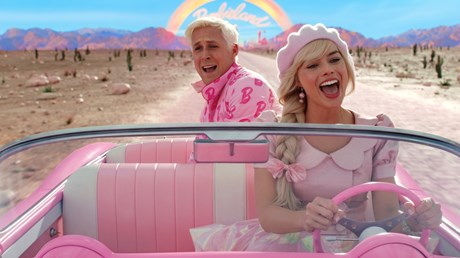Barbie and Ken Go East of Eden
For Christians, Greta Gerwig’s latest film is an opportunity to reckon with the “fortunate fall.”

Questions about gender and sexuality plague the evangelical church, from the SBC to the PCA. Books on the topic are proliferating. In that context, it’s understandable that some folks see the new Barbie film as another volley in the gender wars. But Greta Gerwig’s latest project is far too layered to be read through a literalist hermeneutic.
Rather than offering a blind affirmation of feminism or a critique of patriarchy, the movie explores how we use ideology to bypass the messier work of growing as humans. The gender wars are not the plot so much as the setting. They shape the world in which Barbie and Ken pursue maturity.
Consider Ken’s character arc. Forever condemned to be “just Ken,” Barbie’s beau finds his identity through relationship to her. He “simps,” or fawningly submits to her, by following her into the Real World. Once there, however, he catches a vision for a different life—one where men rule but more importantly feel seen and valued. Crediting this to The Patriarchy™, Ken carries the idea of male superiority back to Barbie Land as a shortcut to his own growth.
The movie tracks with Christine Emba’s recent observations that modern men are in “a widespread identity crisis—as if they didn’t know how to be.” This loss of self, she argues, is what fuels the popularity of right-wing masculinity gurus from Jordan Peterson to Andrew Tate. Those voices seem to offer young men a path forward. That it so often trends toward misogyny, as Ken’s own journey does, is only part of the point.
Eventually, Ken reckons with the roots of his discontent, which are less about social order and more about an abdication of self through …
